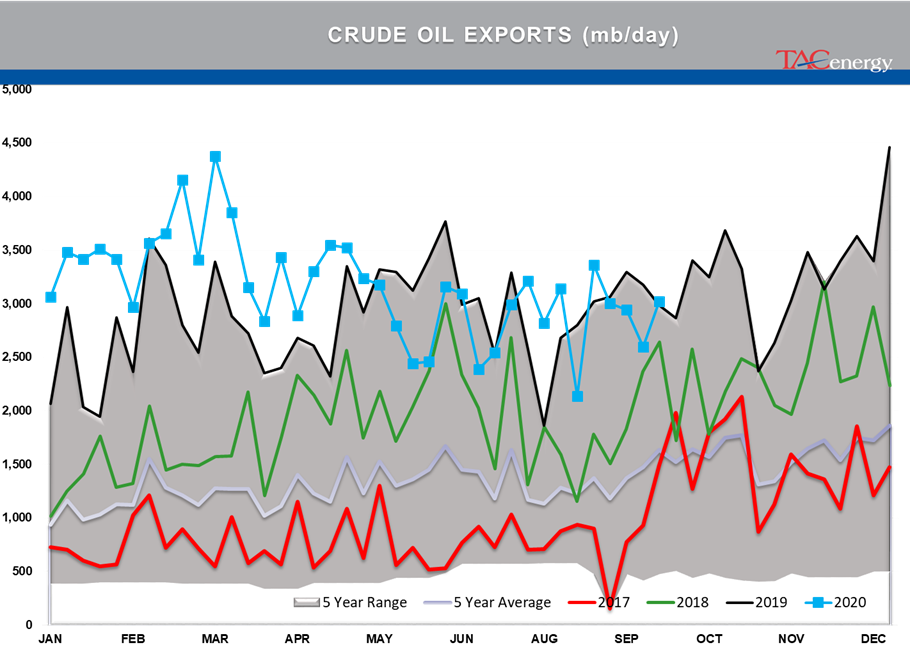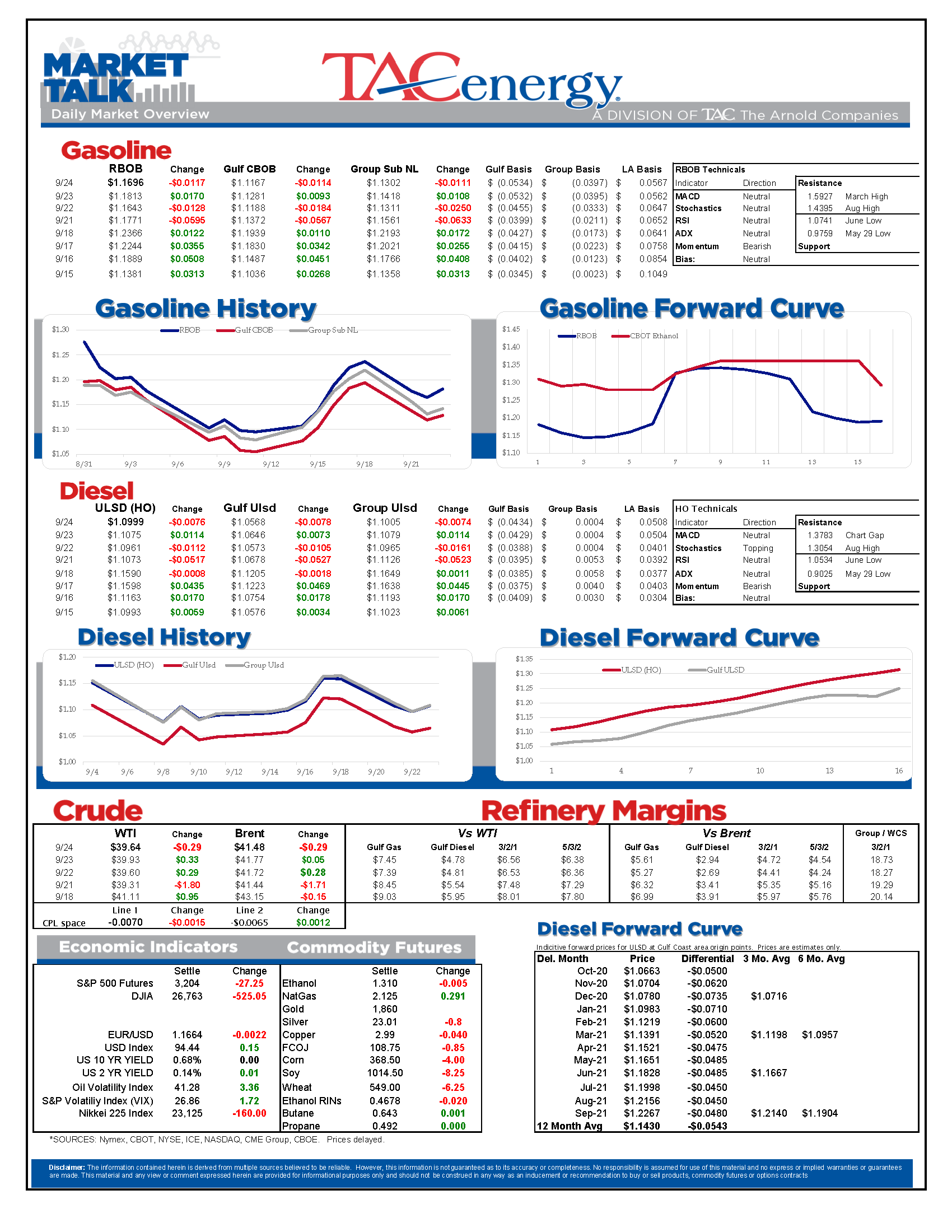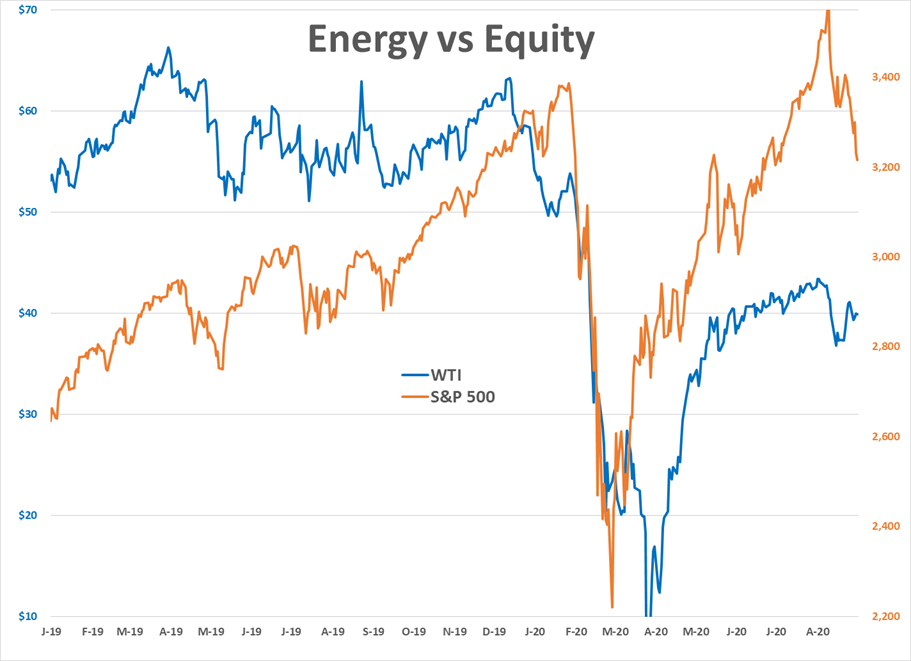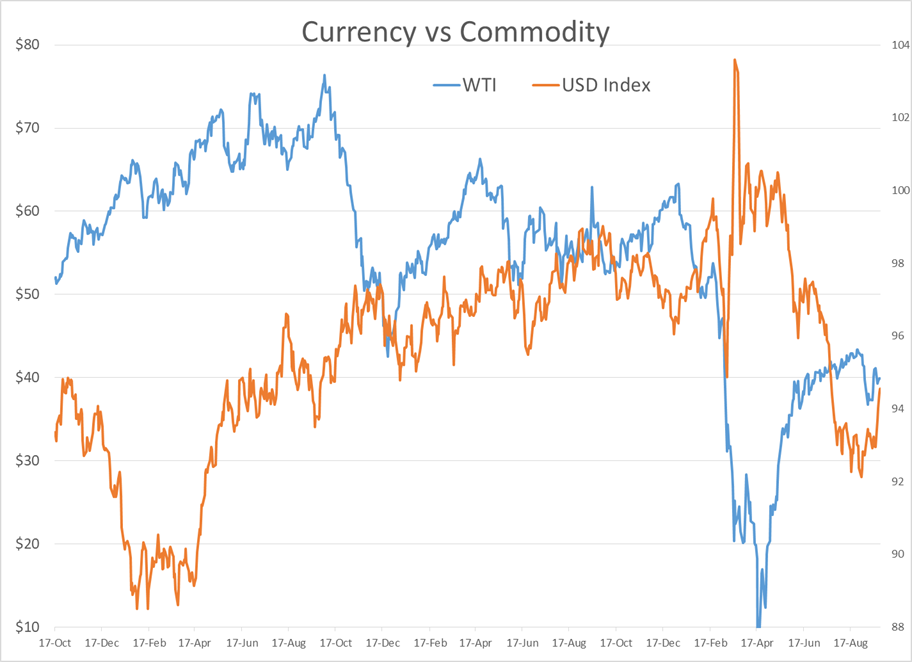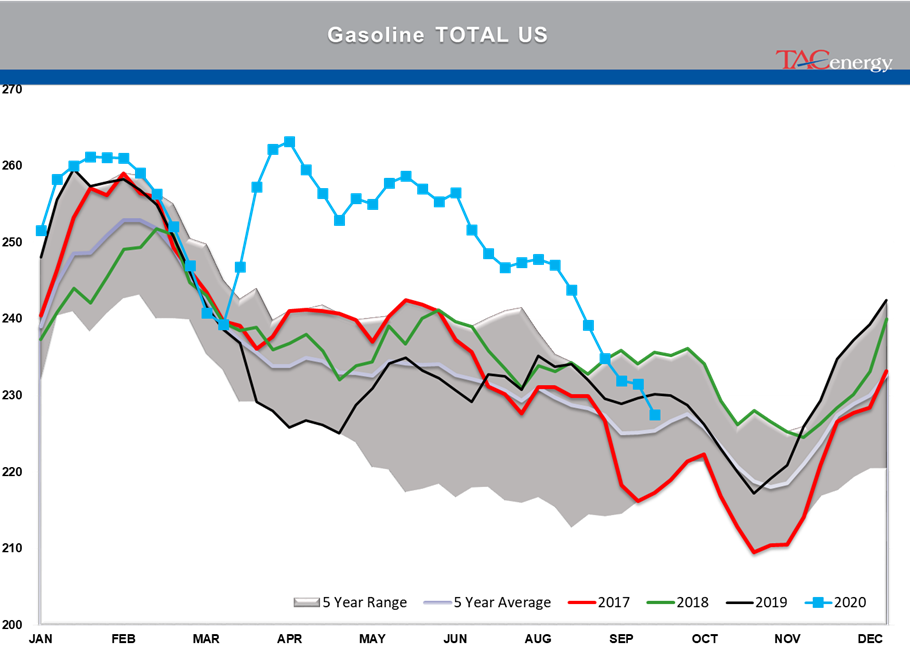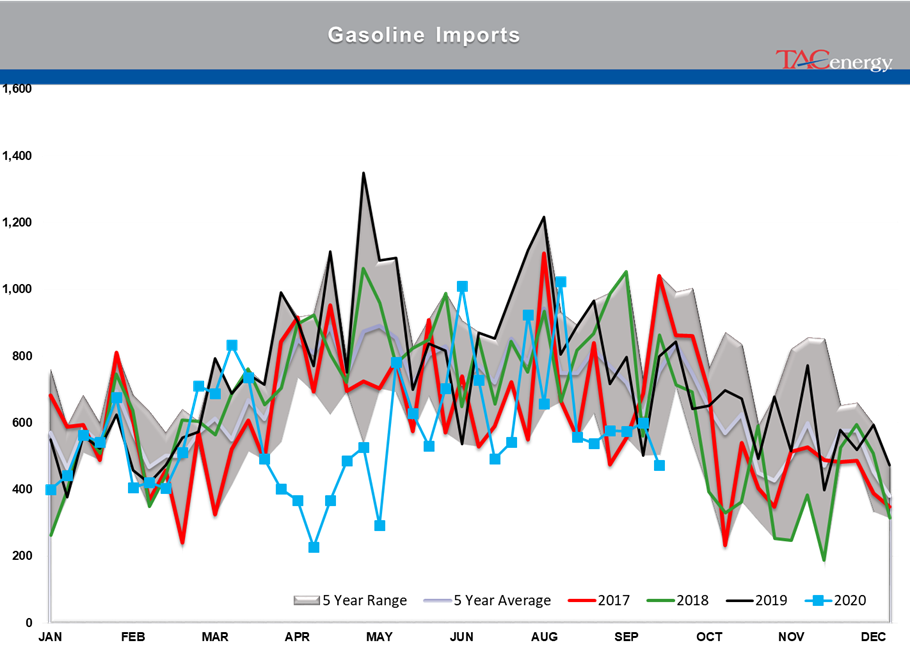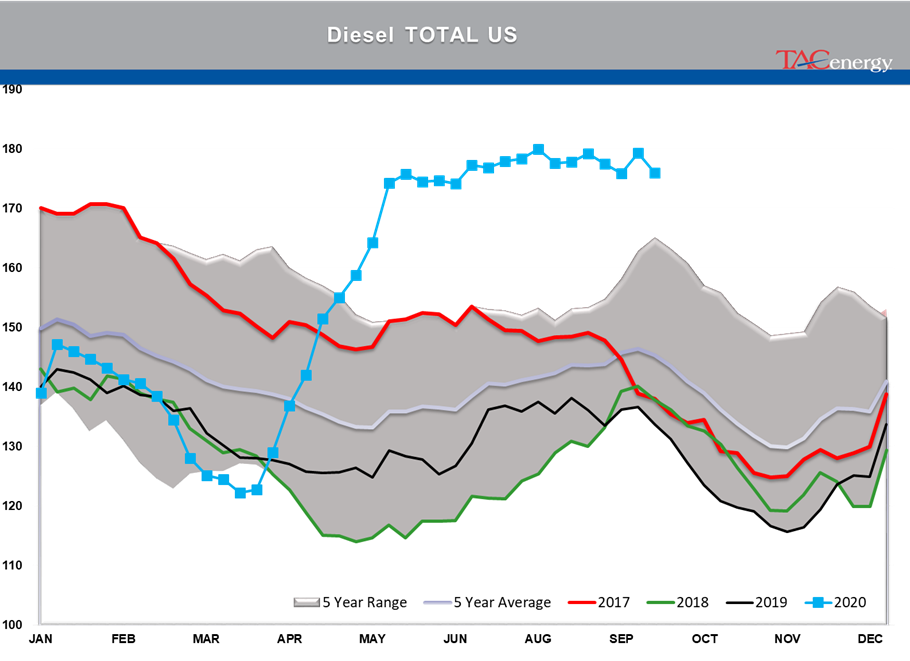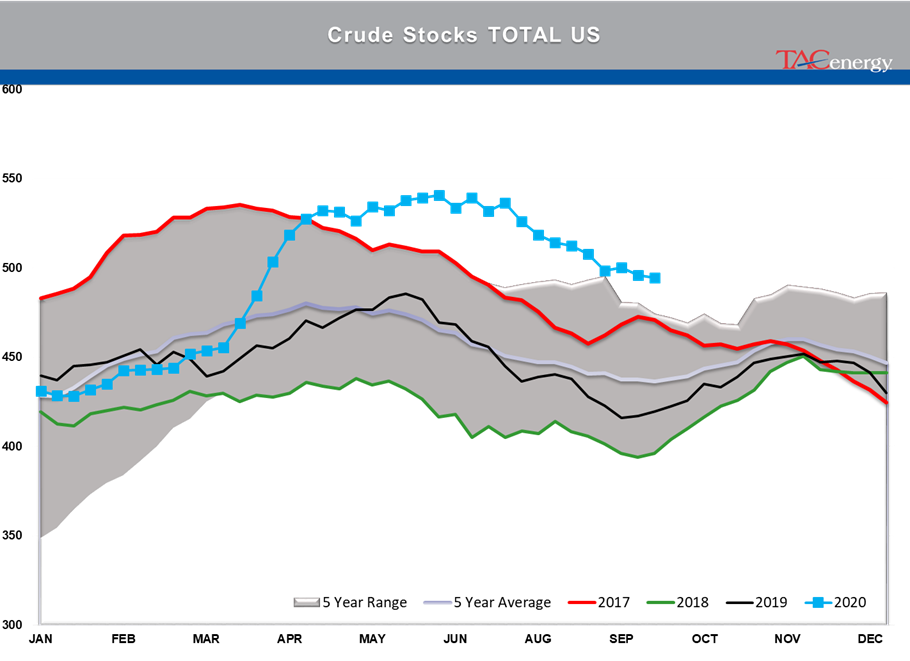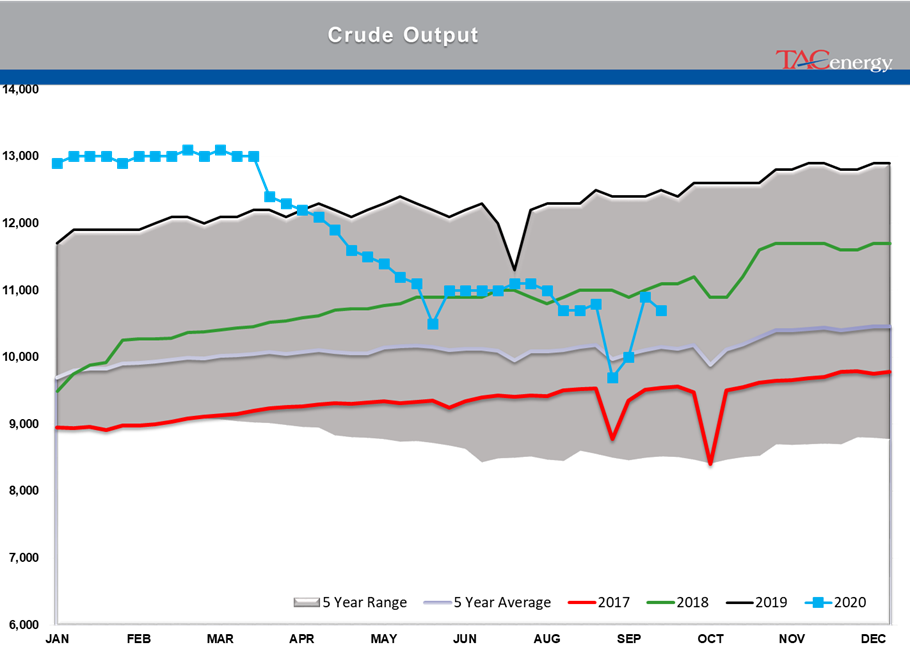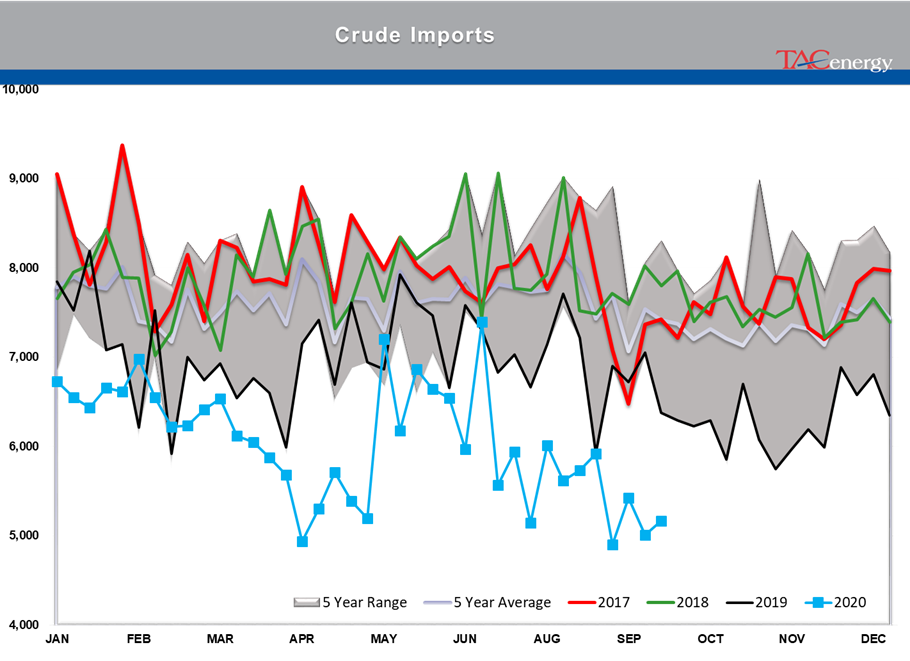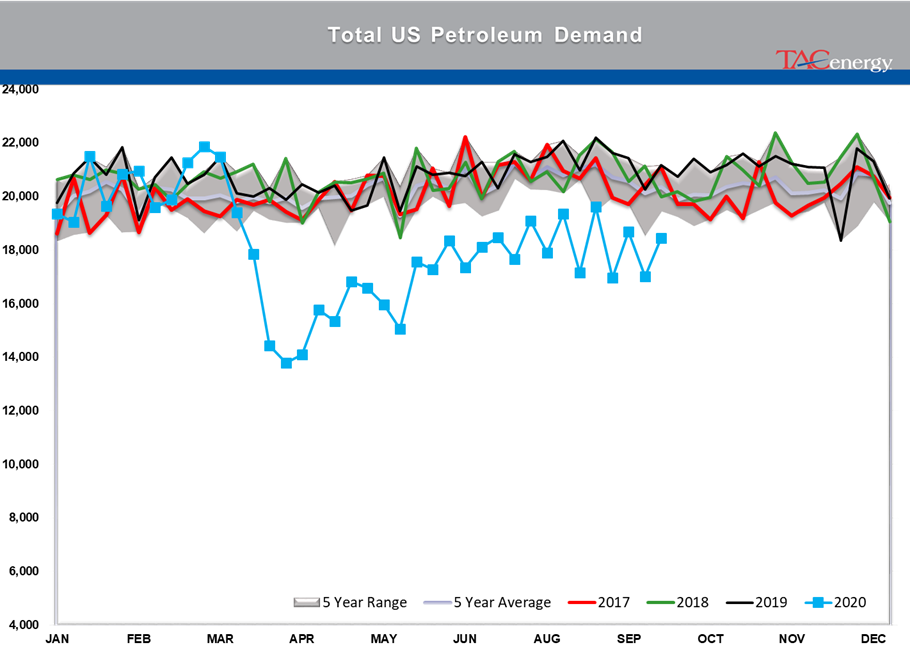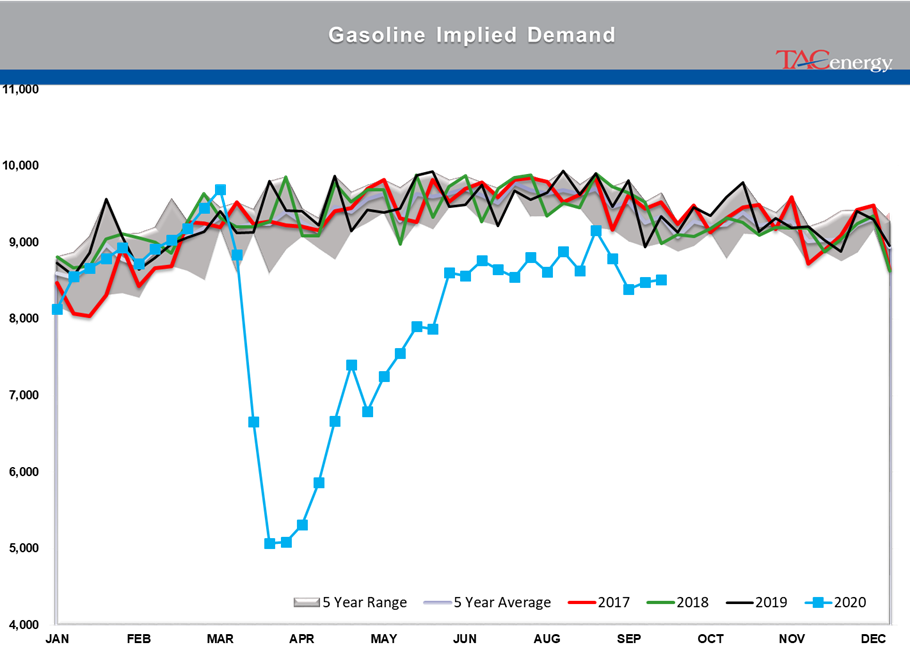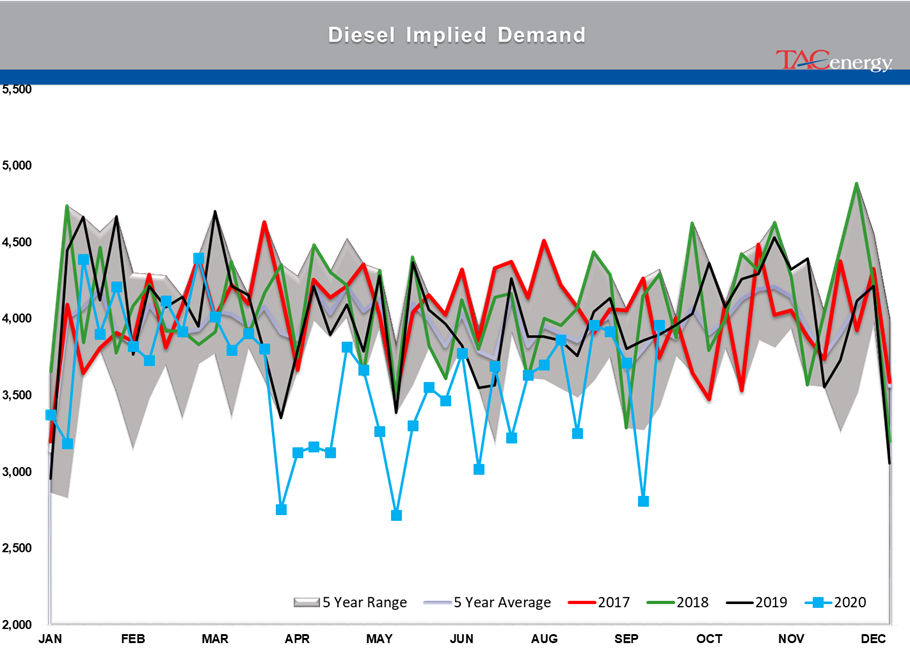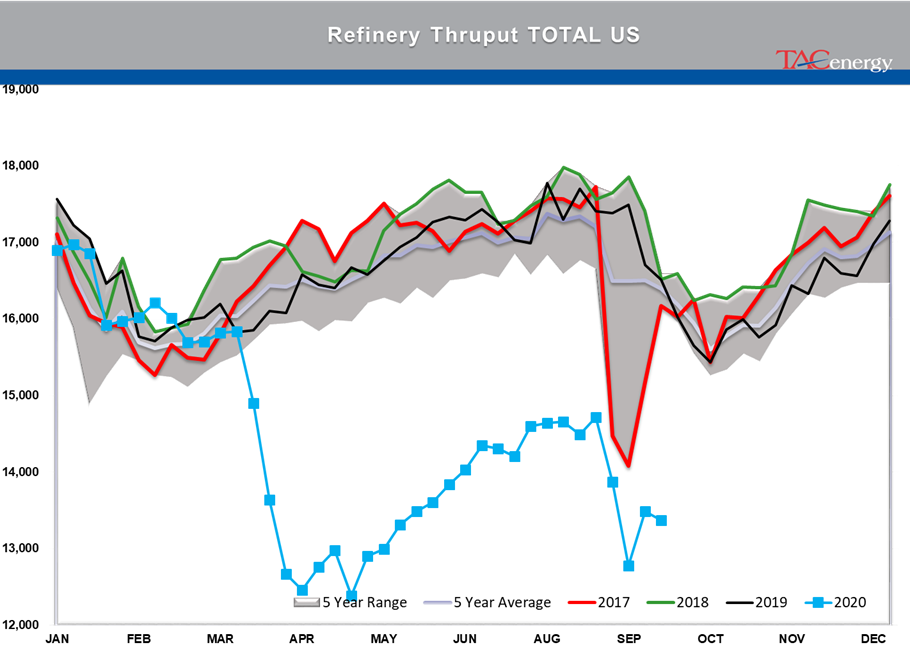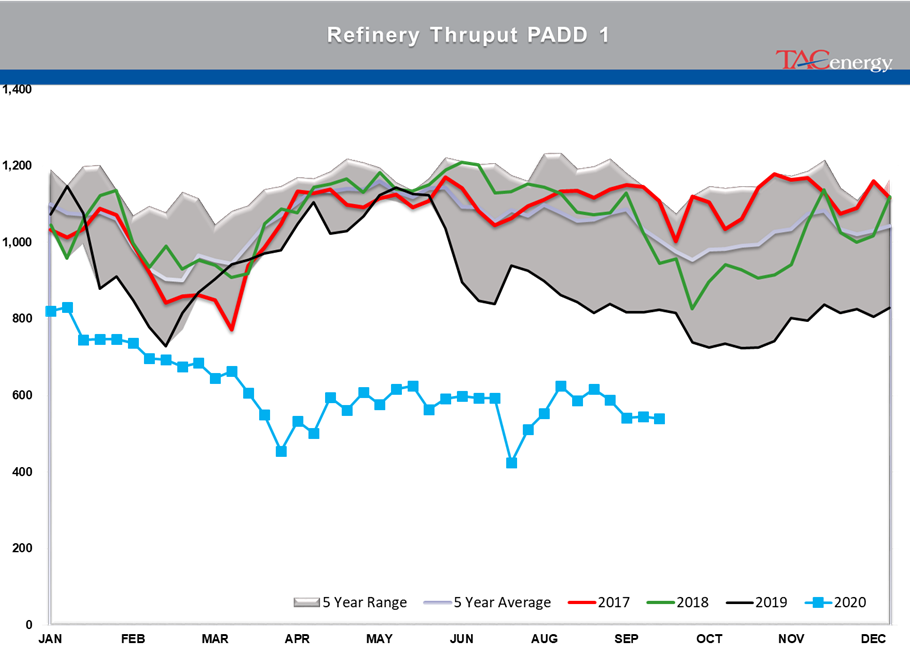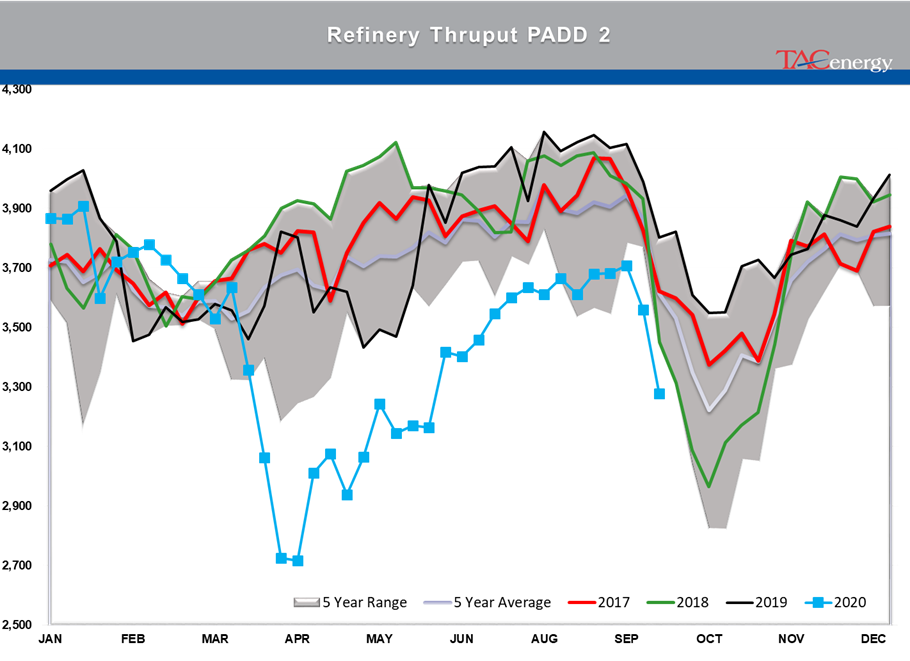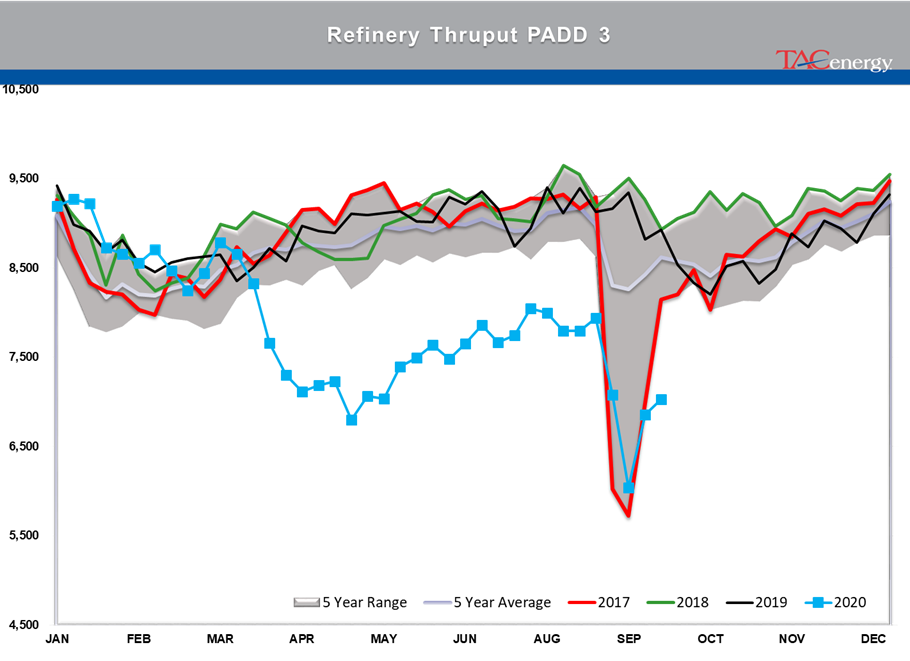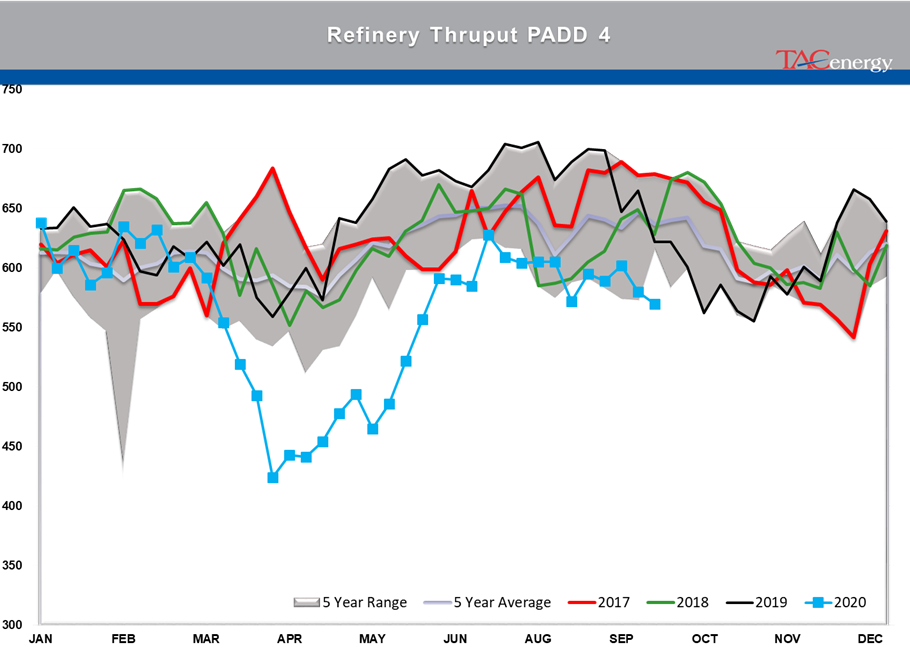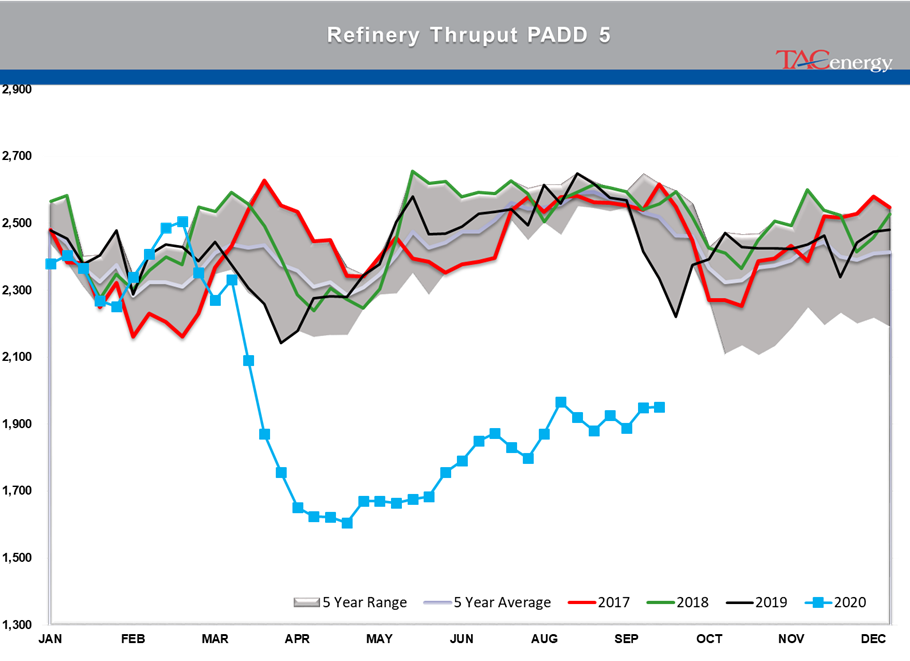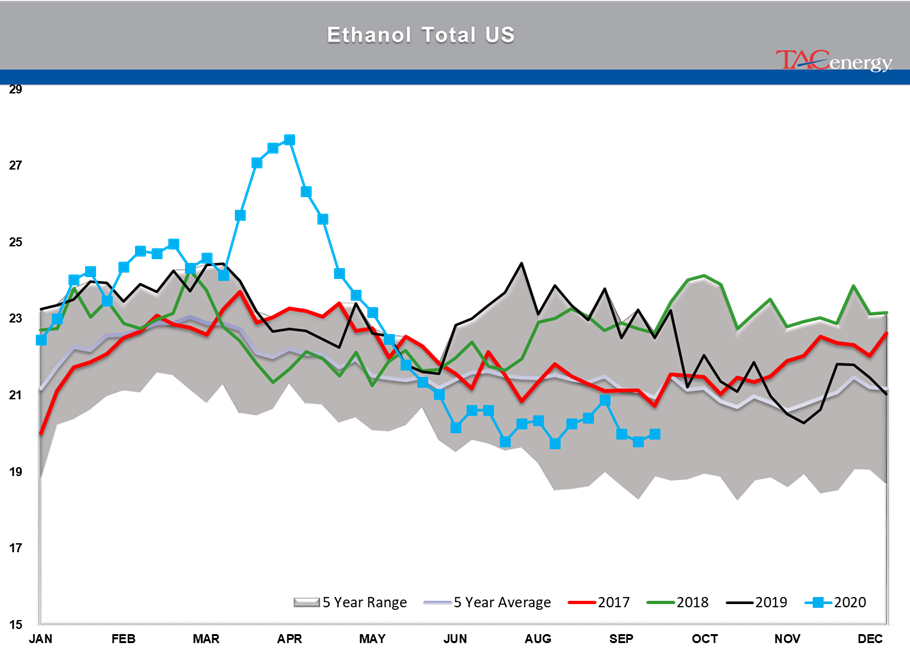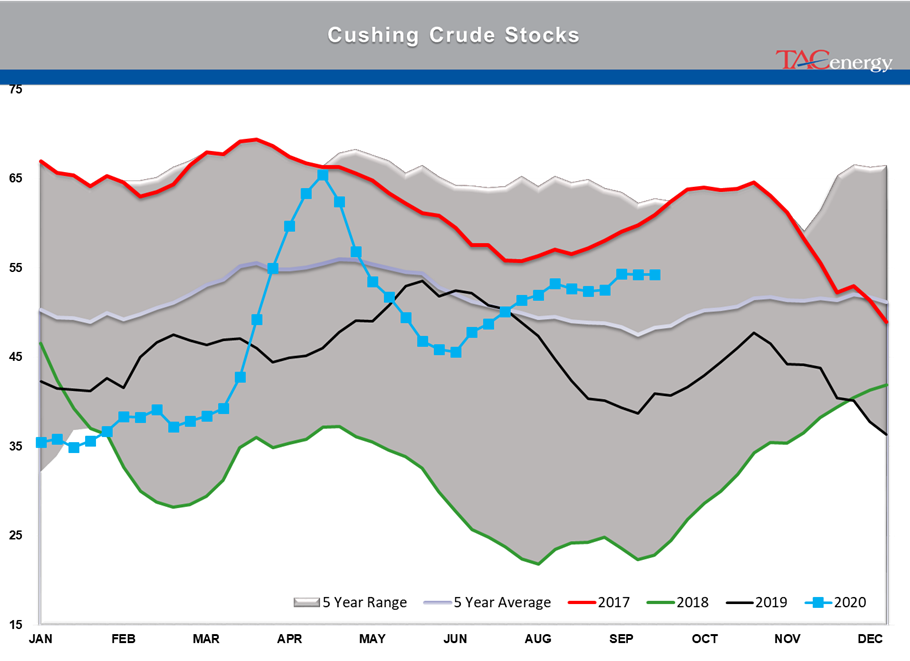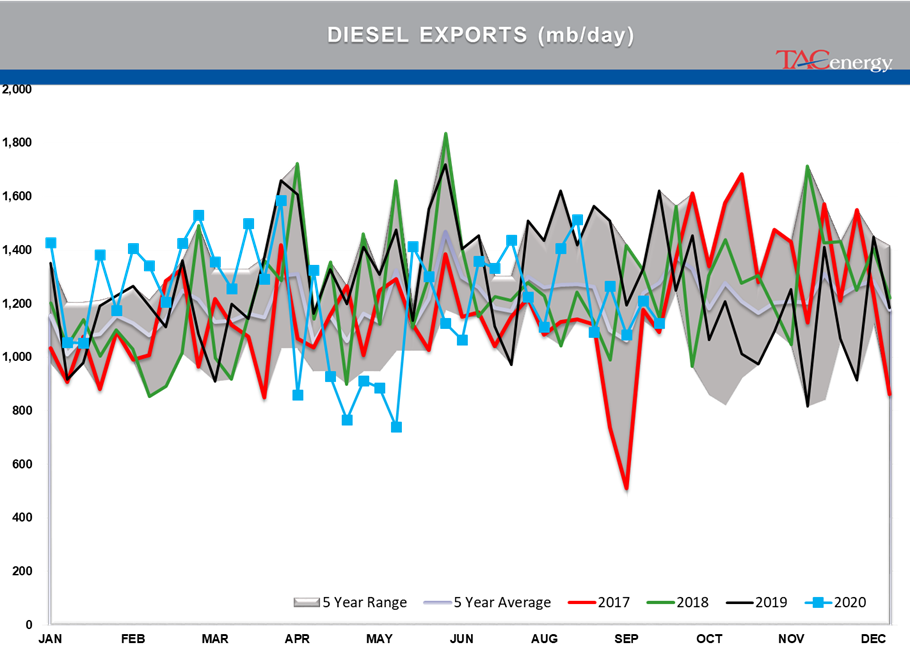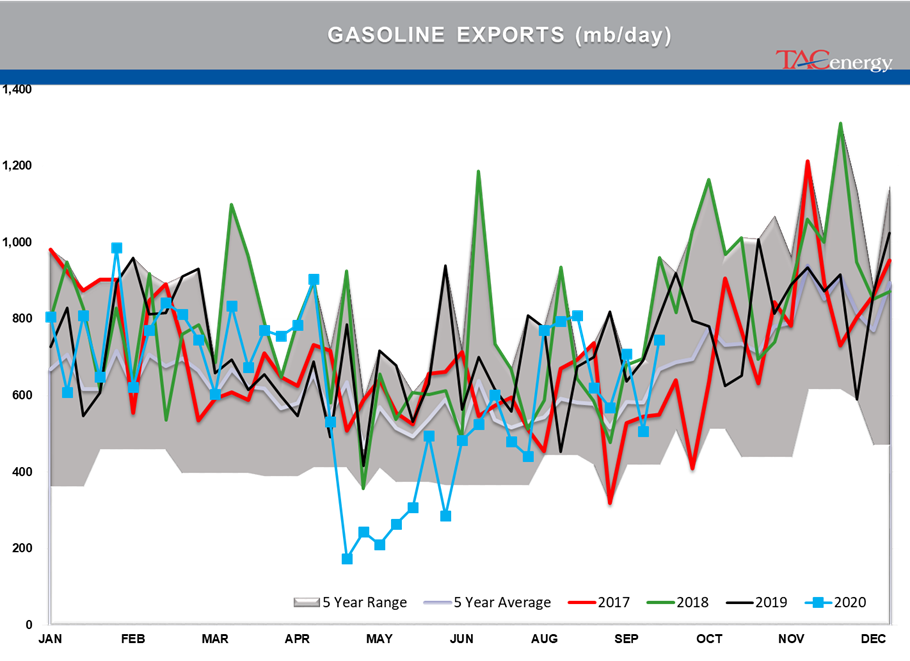Shaky Financial Markets Winning The War?

Weak equity markets squared off with some bullish inventory data for control of the energy market price action Wednesday, and while the good fundamental news won the day, a weak start to Thursday’s action suggests that shaky financial markets may end up winning the war this fall.
Inventory drawdowns and strengthening demand in the weekly DOE report helped the energy complex turn small losses into modest gains on the day. U.S. gasoline stocks fell below year-on-year levels for the first time since COVID shutdowns started pummeling demand six months ago, in what many see as a major victory for refiners. Naysayers will point to a large drop in gasoline imports due to Atlantic storm activity slowing the flow of gasoline from Europe, and the upcoming seasonal demand slowdown as reasons this relatively balanced supply won’t last.
Diesel demand shot up 30% last week according to the DOE’s estimate, which helped inventories pull back from the brink of an all-time high. Export activity for products and crude oil remained steady, suggesting the port disruptions from the multiple storms along the gulf coast has had minimal impact on flows so far.
California’s governor took a page straight out of Atlas Shrugged when he signed an executive order to phase out the sale of gasoline-powered vehicles in the state by 2035. The statement also encouraged drivers to switch to electric cars saying, “Our cars shouldn't make wildfires worse.”
Perhaps he forgot about the thousands of California wildfires caused by electric transmission lines, or how that electricity is generated in the first place.
This is the same person who less than a year ago called for an investigation into why the state’s gasoline was so much more expensive than the rest of the country, failing to recognize the impact of more than $1/gallon in state taxes and fees that set the state apart from most of the country, or the boutique fuel grades mandated by CARB and other policies that continue to force refiners in the state to shut down.
Total is the latest refiner to announce plans to convert one of its facilities from crude oil to biofuels over the next two years. The notice also highlights the growing interest in bio/renewable plastics, which will become a more mainstream idea as the momentum for carbon reduction builds. The refining industry was already expected to produce more plastics than transportation fuels in the coming decades, so the pressure to find renewable options on that side of the output will be strong.
Click here to download a PDF of today's TACenergy Market Talk.
Latest Posts
Week 16 - US DOE Inventory Recap
Energy Markets Trading Quietly In The Red As Ethanol Prices Rally To Five-Month High
The Struggle For Renewable Producers Continues As A Rapid Influx Of Supply And Crashing Credit Prices Make Biodiesel
After Years Of Backwardation, Diesel Prices Have Slipped Into Contango Over The Past Week
Social Media
News & Views
View All
Week 16 - US DOE Inventory Recap

Energy Markets Trading Quietly In The Red As Ethanol Prices Rally To Five-Month High
Energy markets are trading quietly in the red to start Wednesday’s session after a healthy bounce Tuesday afternoon suggested the Israel-Iran-linked liquidation had finally run its course.
There are reports of more Ukrainian strikes on Russian energy assets overnight, but the sources are sketchy so far, and the market doesn’t seem to be reacting as if this is legitimate news.
Ethanol prices have rallied to a 5-month high this week as corn and other grain prices have rallied after the latest crop progress update highlighted risks to farmers this year, lower grain export expectations from Ukraine, and the approval of E15 blends this summer despite the fact it pollutes more. The rally in grain and renewables prices has also helped RIN values find a bid after it looked like they were about to test their 4-year lows last week.
The API reported small changes in refined product inventories last week, with gasoline stocks down about 600,000, while distillates were up 724,000. Crude oil inventories increased by 3.2 million barrels according to the industry-group estimates. The DOE’s weekly report is due out at its normal time this morning.
Total reported another upset at its Port Arthur refinery that’s been a frequent flier on the TCEQ alerts since the January deep freeze knocked it offline and damaged multiple operating units. This latest upset seems minor as the un-named unit impacted was returned to normal operations in under an hour. Gulf Coast basis markets have shrugged off most reports of refinery upsets this year as the region remains well supplied, and it’s unlikely we’ll see any impact from this news.
California conversely reacted in a big way to reports of an upset at Chevron’s El Segundo refinery outside of LA, with CARBOB basis values jumping by more than a dime. Energy News Today continued to show its value by reporting the upset before the flaring notice was even reported to area regulators, proving once again it’s ahead of the curve on refinery-related events. Another industry news outlet meanwhile struggled just to remember where the country’s largest diesel seller is located.
Click here to download a PDF of today's TACenergy Market Talk

The Struggle For Renewable Producers Continues As A Rapid Influx Of Supply And Crashing Credit Prices Make Biodiesel
The sigh of relief selloff continues in energy markets Tuesday morning, with gasoline prices now down more than 20 cents in 7 sessions, while diesel prices have dropped 26 cents in the past 12. Crude oil prices are within a few pennies of reaching a 1 month low as a lack of headlines from the world’s hot spots allows some reflection into the state of the world’s spare capacity for both oil and refined products.
Gasoline prices are trading near a 6-week low this morning, but still need to fall about another nickel in order to break the weekly trendline that pushed prices steadily higher since December. If that trend breaks, it will be safer to say that we saw the end of the spring gasoline rally on April 12th for the 2nd year in a row. Last year RBOB futures peaked on April 12 at $2.8943 and bottomed out on May 4th at $2.2500. The high (at this point) for this year was set on April 12th at $2.8516, and the low overnight was $2.6454.
It’s not just energy commodities that are seeing an unwind of the “flight to safety” trade: Gold prices had their biggest selloff in 2 years Monday and continue to point lower today. Just how much money poured into commodities in the weeks leading up to the direct confrontation between Israel and Iran is unclear, but we have seen in year’s past that these unwind-events can create a snowball effect as traders can be forced to sell to cover their margin calls.
Supply > Demand: The EIA this morning highlighted the record setting demand for natural gas in the US last year, which was not nearly enough to offset the glut of supply that forced prices to a record low in February. A shortage of natural gas in Europe was a key driver of the chaotic markets that smashed just about every record in 2022, and an excess of natural gas supply in Europe and the US this year is acting as a buffer, particularly on diesel prices.
The struggle for renewable producers continues as a rapid influx of supply and crashing credit prices make Biodiesel, RD and SAF unprofitable for many. In addition to the plant closures announced in the past 6 months, Vertex Energy reported Monday it’s operating its Renewable Diesel facility in Mobile AL at just 50% of capacity in Q1. The truly scary part for many is that the $1/gallon Blender's tax credit ends this year and is being replaced by the “Clean” Fuel production credit that forces producers to prove their emissions reductions in order to qualify for an increased subsidy. It’s impossible to say at this point how much the net reduction will be for domestic producers, but importers will get nothing, and at current CI values, many biodiesel producers may see their “blend credit” cut by more than half.
Click here to download a PDF of today's TACenergy Market Talk.
